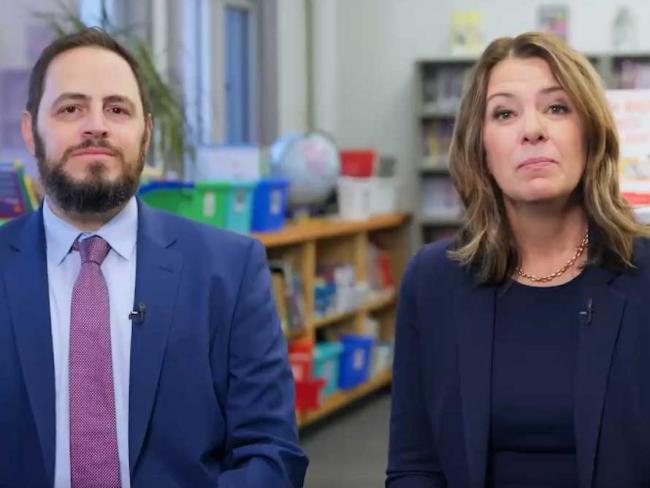Articles Menu

Oct. 28, 2025
Since the start of the legal strike by 51,000 Alberta teachers on Oct. 6, elements of the United Conservative Party government have been chomping at the bit to use the notwithstanding clause of the Charter of Rights and Freedoms to end the strike and school the teachers on the consequences of their defiance.
So, Monday afternoon, as widely expected, the UCP government brought the hammer down on the Alberta Teachers’ Association and its members in the form of Bill 2, the cutely titled Back to School Act, which they rammed through the legislature in less than seven hours. The bill uses the notwithstanding clause which allows provinces to remove Canadians fundamental rights under the Charter.
Premier Danielle Smith hoped, obviously, to convey several key messages with this heavy-handed action.
To unions, especially public sector unions: We don’t like negotiating and, if you defy us, we won’t negotiate at all.
To the federal Liberals in Ottawa: We don’t like the way the Canadian Constitution works and we’ll use the Section 33 of the Charter to block your laws too.
And to every one of us here in the land of the Strong and Free (sotto voce): We won’t let the fundamental human rights guaranteed by the Charter, but subject to the notwithstanding clause, stand in the way of anything we want to do!
Bill 2 contains harsh penalties for individuals and the teachers’ union should the strike continue, $500 a day and $500,000 a day respectively. It also imposes a collective agreement that ATA members rejected by nearly 90 per cent in a ratification vote last month.
In addition, it strips the union of its right to collectively bargain local conditions with individual school boards, a normal part of education-sector labour relations in Alberta, until August 2028, when the imposed contract expires.
Smith claimed at a news conference Monday afternoon that the bill’s goals could have easily been accomplished without using the notwithstanding clause.
But the problem with drafting a proper law without using the notwithstanding clause and inadvertently proving her government cares not a whit about the fundamental rights guaranteed in the Charter, of course, is that there could be court challenges.
So using Section 33, explained Justice Minister Mickey Amery at the news conference, “will remove the uncertainty a court case would create.”
This is not a government that respects the rule of law!
Finance Minister Nate Horner and Education Minister Demetrios Nicolaides also played supporting roles at the newser. Horner reminded the media about the heavy fines teachers could face. Nicolaides mostly looked worried, as if he had other things on his mind — perhaps that the recall petition with his name at the top might now grow legs. He did appear in a little social media video with the premier, woodenly reading from a teleprompter.
By Monday evening, ATA leaders had not yet commented on the legislation. They will want to study the bill carefully before they want to speak about their next moves.
But former president Larry Booi, who led the ATA from 1999 to 2003, observed that Smith now owns whatever happens next. (That may explain why the premier, as she is wont to do in such circumstances, immediately hopped on a jet and took a powder to the relative safety of Saudi Arabia and United Arab Emirates. She’s not scheduled to return to Wild Rose Country until Nov. 5.)
“Things are clearly going to get much worse, and since this has become Danielle’s Strike, she alone is going to wear this thing,” Booi predicted. “It was so unnecessary and misguided that you have to wonder if it isn’t caused by her near-sociopathic certainty that she is right about everything and her way is the only way.”
Something like this happened on his watch, he recalled.
“The key to the teachers’ highly effective reaction to the similar draconian legislation of Bill 12 in 2002 was to withdraw voluntary services. Teachers had obeyed the law by going back to work and the public tended to see the withdrawal of voluntary services as a legitimate reaction to unfair legislation.
“It was devastatingly successful, and the government within weeks came to the ATA to discuss moderating their policies.” That eventually led to a reasonable settlement.
“Withdrawal of voluntary services is even more likely to be successful now, because teachers have even more support than they did 2002, and the legislation is clearly more oppressive,” Booi argued.
“The image of a teacher being fined for not supervising the ping-pong club is utterly ludicrous. I’m fairly sure not even a premier as misguided and ideological as Ms. Smith would make that mistake,” he concluded, perhaps too optimistically.
Meanwhile, leaders of other Alberta and Canadian unions are deeply concerned about the implications of Bill 2.
Smith urged the labour movement not to take action to assist the ATA, insisting that “this is a very specific action we’re taking in this specific instance because we’ve got two different tables where there could potentially be disruptive strikes, and we think kids have been disrupted enough.”
“So I don’t think people should draw some sort of general application that this is the approach that we would take in every instance of labour action,” she said.
But, really, what other conclusion can one draw?
The strike could end as early as Wednesday. The fallout will last much longer.
[Top photo: Alberta Education Minister Demetrios Nicolaides and Premier Danielle Smith made the case Monday for using the notwithstanding clause to end the three-week-old provincial teachers’ strike in a slick little social media video. Screenshot via Alberta government video.]